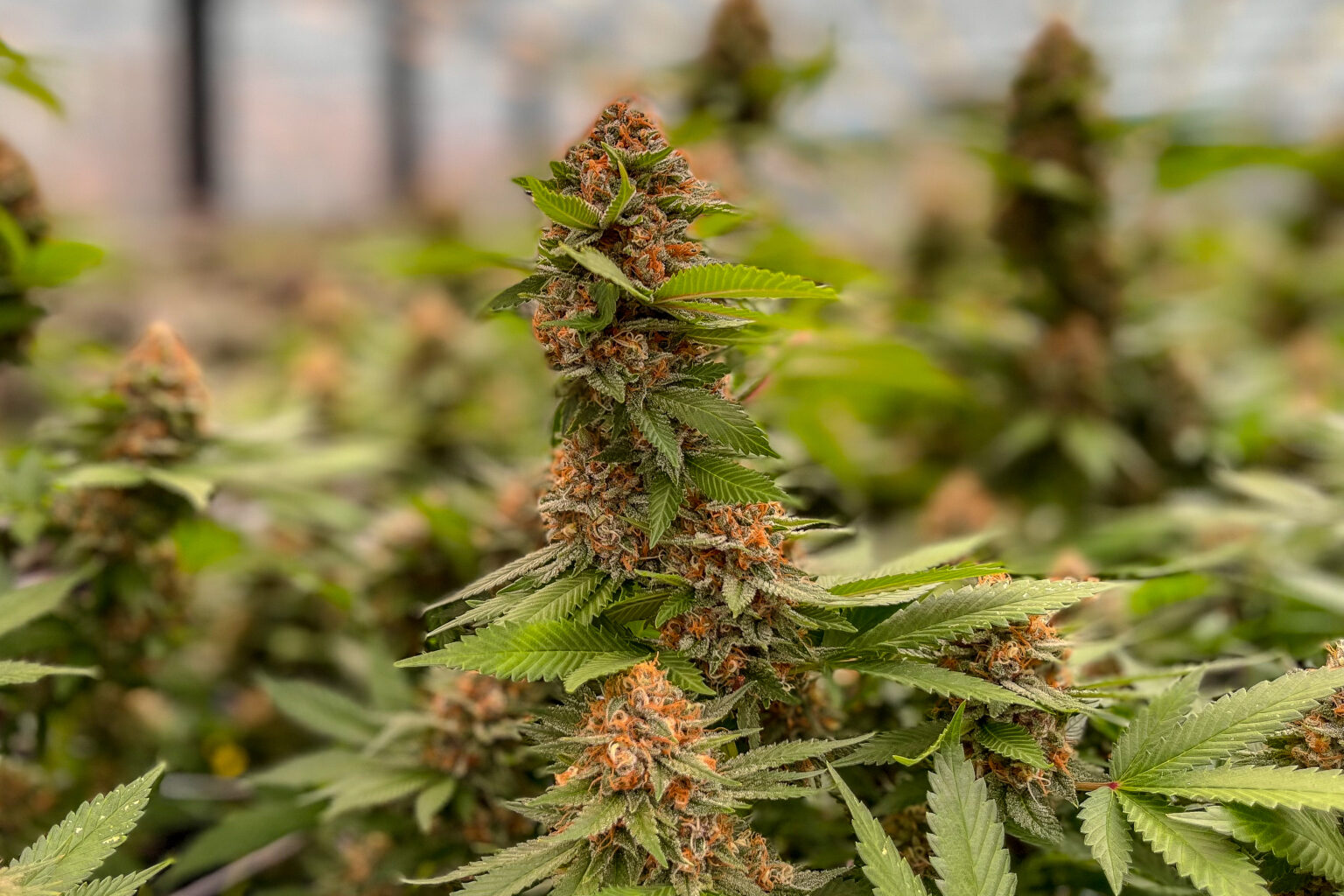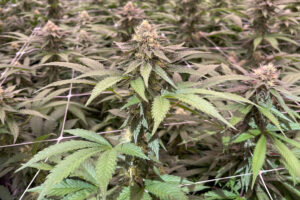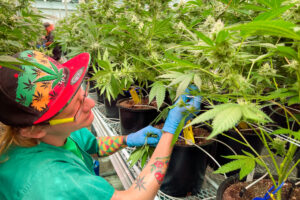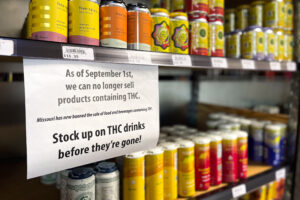5:55
News Story
At the center of Missouri’s massive marijuana recall is a THC concentrate, or distillate, made partially from hemp.
Robertsville-based marijuana manufacturer Delta Extraction has denied accusations that it illegally imported marijuana into the state by arguing it actually imported a non-psychoactive hemp product that was converted into THC once in Missouri.
The commissioner overseeing Delta’s appeal of the recall and license suspension said the company will likely lose that argument, because it’s illegal to add “hemp-derived chemically modified ‘converted’ cannabinoids” to marijuana products.
But a lab in Florida — where Delta bought a good amount of product — says the commissioner’s description of “chemically modified” isn’t quite right.
JJ Coombs, owner and CEO of Arvida Labs in Fort Lauderdale, walked The Independent through the extraction process to make the concentrated THC-A, a cannabinoid that must be heated to produce a high — insisting it didn’t involve a chemical conversion.
It’s a fairly new process, Coombs said, that involves breeding hemp plants to have higher concentrations of the potentially intoxicating property THC-A. And it’s a process neither the state nor Delta leaders could explain during the company’s appeal proceedings.
Unlike marijuana, hemp has very little psychoactive properties naturally — which is why it was taken off the federal controlled substance list in the 2018 farm bill. But since then, businesses like Coombs’ have been in a race to create ways to produce the most predominant psychoactive active element in marijuana, delta-9 THC, using the hemp plant.
“THC-A is becoming popular because it’s able to convert into delta-9,” he said. “It’s like the new hot thing… That’s what everybody wants right now.”
For Missouri’s marijuana industry, businesses like Coombs’ pose a threat to their livelihoods, especially because Missouri cannabis licensees must go through a rigorous and costly regulatory process — one that hemp companies don’t.
However, for the Missouri hemp industry, the Delta Extraction case makes their argument for them: That hemp-derived THC is legal under federal law and it’s a safe, viable business for Missouri farmers.
Sean Hackmann, president of the Missouri Hemp Trade Association, said Delta sold more than $20 million of distillate that was a mixture of marijuana grown in Missouri and hemp from other states.
“Twenty million dollars in the Missouri hemp industry would be huge, if that was produced, extracted and processed inside our state,” Hackmann said. “But it was all some other state that benefited from that. Not our Missouri industry.”
As the Delta recall winds its way though state legal proceedings, the future of the hemp industry has also been in legal flux on a federal level.
On Sept. 8, a federal judge in Arkansas granted a preliminary injunction in a lawsuit against the state, saying that hemp-derived cannabinoids, like THC-A, are protected under the 2018 farm bill.
But a few months before that, the U.S. Drug Enforcement Administration reaffirmed its position that all these cannabinoids are illegal under federal law and not protected by the farm bill, said attorney Clark Wu, an Arizona-based who specializes in hemp and cannabis law.
“Ultimately, it’s hard to say whether this judge or the DEA is more ‘right,’ as different limitations of authority constrain them,” Wu said.
The federal judge indicated that Congress should be the one to decide how to regulate hemp-derived THC products, Wu said.
“The DEA, on the other hand, is viewing everything from a criminal lens,” Wu said, “and the agency is also bound by precedent in agency decisions and international treatises concerning cannabis scheduling. These cases will likely continue to arise until Congress resolves the gap in federal hemp legislation.”
An attorney for Delta Extractions did not respond to a request for comment.
Arvida’s process
Coombs, who is an advocate within the hemp industry in Florida, says staying in line with the changing legal opinions is taxing on hemp businesses.
“You’re literally sometimes a couple of degrees away from something not being compliant and losing a lot of money,” he said.
As far as his company’s process and products, he says he’s an open book.
“I just want to be transparent about this,” he said, “and make sure that people understand what this is — because it is complex, right?”
The confusion about Arvida Labs’ product being made using a chemical conversion process is understandable, he said, because most people don’t know labs can extract large amounts of THC-A from the hemp plant.
Missouri company at center of cannabis recall used hemp instead of marijuana in products
The most common way to get delta-9 THC from hemp is usually a chemical conversion process from CBD, which is the more common cannabinoid in hemp.
And that’s exactly the process Delta’s leadership testified was being used, at one point, with its products — a revelation that shocked businesses who purchased Delta’s distillate and thought it was made with 100% marijuana.
But it also outraged labs that test cannabis products in Missouri and need to know what chemicals were used in the process in order to ensure safety tests are accurate.
Although Delta’s leaders were asked during appeal proceedings to explain the difference between the CBD conversion process and the THC-A product, they failed to do so.
The distinction is important, Coombs said.
Coombs says Arvida purchased the hemp from farmers in Texas, Tennessee and Kentucky who’ve learned to breed the plants to have higher concentrations of THC-A, he said, using federally-approved strains.
THC-A is not intoxicating unless you heat it up, and then it turns into delta-9 THC. For example, eating raw marijuana flower won’t produce a high because there’s only a small amount of delta-9 THC but a lot of THC-A.
Hemp has very little THC-A, so it takes about 90 pounds of hemp to make 1 kilo of THC-A isolate, or powder, Coombs said.
“It’s not that much in the grand scheme of things,” he said. “Most labs that are still in business are doing on average 16,000 pounds of extraction per day, if not more.”
The isolate is then put into oil for transport, which is why the shipping labels the state authorities presented as exhibits in the Delta Extraction case said “THC-A oil,” Coombs said. It didn’t mean that it was concentrated THC-A oil, he said, because that would make it more likely to convert into delta-9 THC before it got to Missouri — and the company went through what’s called a “decarboxylation” process, or heating it.
He said Arvida’s THC-A didn’t go through an “isomeric conversion” — or the process of converting CBD to THC which often involves a variety of chemicals. Because of that, he said it would have passed all the Missouri mandated tests, which look for residue from chemicals used in the typical extraction process.
And because the hemp was grown in Texas, he said, so there were no foreign pesticides used that the lab wouldn’t have picked up on if the hemp was grown in another country.
However, Kevin Halderman, board member for the hemp association and a hemp business owner in Osage Beach, said he questions whether or not the hemp came from Texas.
“They don’t have to disclose that,” Halderman said. “If they’re in Florida, a lot of Florida products come from out of the country. They’re coming from Colombia, Costa Rica or Panama.”
Coombs insists that it isn’t foreign hemp.
Green Precision Analytics is one of the labs that Delta Extraction used to test the distillate at the heart of the recall. Anthony David, the lab’s owner and chief operating officer, told The Independent previously that he had no idea Delta was incorporating imported hemp in the products.
However, David also said there was no trace of the THC coming from an isomeric conversion process. Usually he can see a difference in curves of the chromatography, David said, but he didn’t in this case.
Coombs said that’s because it was done through a normal extraction process.
Delta’s appeal
The question about the hemp product was discussed during a Aug. 14 hearing regarding Delta Extraction’s license suspension and the recall.
Delta Extraction is a licensed marijuana manufacturer that specializes in making distillate, a highly potent and pure form of THC oil used for things like vape pens and edibles.
On Aug. 2, the state regulating agency suspended Delta Extraction’s license after accusing the company of sourcing untested “marijuana or converted hemp from outside of a Missouri licensed cultivation facility.”
The state argues it banned importing hemp from other states and adding it to marijuana products in its emergency rules filed on Jan. 20.
In its appeal, Delta argues that the Missouri didn’t specifically ban this process until the state’s final rules went into effect on July 30 of this year.
But Carole Iles of the Administrative Hearing Commission said in an Aug. 29 order that the company will likely lose on that point. The only thing the cannabis regulating agency, the Missouri Department of Health and Senior Services, added to this line in the final rules was the clause “such as THC-A …”
“We agree with the department that language added to the permanent rule … did not change the requirement of the emergency rule that THC in marijuana products could only be derived from marijuana cultivated by a Missouri-licensed cultivation facility,” the order states.
Did recalled Missouri cannabis products pose health risks? Regulators aren’t sure
The hemp association does not have an official position on the Delta case. However, Halderman said he’s personally “sad” that customers were misled.
At some point, Delta Extraction was taking CBD and chemically converting it into THC. They were then adding it to THC concentrate from Missouri-grown marijuana concentrate and not disclosing that to marijuana customers.
“They were straight up lied to,” Halderman said.
Probably the most frustrating piece for Halderman, he said, is that Missouri industry leaders have consistently been using “rhetoric” that hemp-derived THC products are unsafe. This spring, marijuana industry leaders also pushed for legislation to regulate hemp-derived THC products, and Halderman said it would’ve killed their industry.
This spring was also the time when Delta Extraction was selling large amounts of the distillate that led to the recall.
“At the same time that they’re trying to make us illegal, they were using our whole process,” he said. “Not a portion of it, our whole process.”
‘Unclear’ testimony
During the hearing, Iles was trying to understand more about what Delta Extraction was doing. She said the company leaders and state officials were using the CBD and THC-A oils “interchangeably.”
“I think the testimony was kind of unclear,” Iles said at the hearing. “It looks like we’re all kind of confused here.”
Coombs said that marijuana companies who purchased Delta’s distillate should not feel “duped” because the same extraction process used to get delta-9 THC from marijuana was used to get THC-A from hemp.
“It’s the same exact thing,” he said. “There’s no difference. Hemp is cannabis, just with no delta-9 THC.”
Both hemp and marijuana belong to the same species, Cannabis sativa, and the two plants look somewhat similar. The defining difference between hemp and marijuana is how much delta-9 THC they each have.
By federal law, marijuana refers to all parts of the plant cannabis sativa with more than 0.3% delta-9 THC by dry weight. Hemp is any part of the plant containing less than that.
Wu, along with leaders of Missouri’s hemp industry, call these definitions “legal fiction” because it’s all the same plant.
“Seeds have no THC,” Wu said. “So even though certain seeds can be cultivated into ‘cannabis plants,’ some operators – hemp and marijuana – have taken advantage of the current state of law and lack of federal enforcement to sell seeds across the United States. That is likely how the Florida operator acquired hemp and high THC strains of plants for THCa production.”
Our stories may be republished online or in print under Creative Commons license CC BY-NC-ND 4.0. We ask that you edit only for style or to shorten, provide proper attribution and link to our website. AP and Getty images may not be republished. Please see our republishing guidelines for use of any other photos and graphics.





